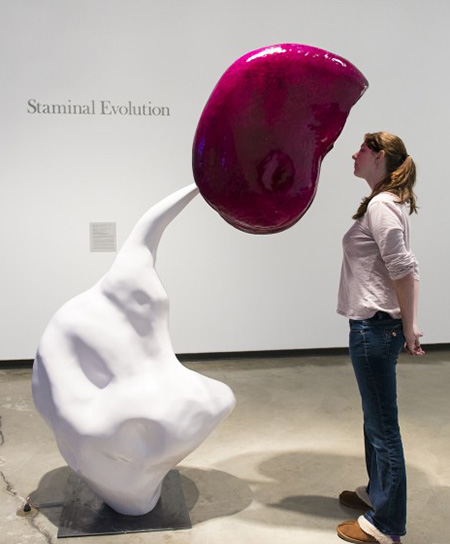
With her exhibition, “fruiting bodies,” Jessica Rath explores the wide-ranging effects of human activity on plants and bees. She addresses how genetic manipulation of our food — specifically the quest for perfect looking vegetables and fruit possessing uniformity of shape and color — has diminished the plants’ health, taste and nutritional value. She examines the activities of bees that pollinate our crops, and which are dying in large numbers due to nefarious human behavior.
This being an art display, the pieces contained within the six bodies of work are visually striking, as well as conceptually and philosophically meaningful. The artist explains that the show investigates the aesthetics of grocery tomatoes and apples, the politics of wild apple forests and the importance and diversity of native bees, particularly at the host venue. She adds that the gallery is a “permeable membrane,” enabling ideas to flow through it.
While the first three series in this exhibition are derived from previous ones that Rath displayed over the last ten years, the conjunction of these, along with three new series, accentuates the message of how our food and its supporting bees are in peril. The series “Ripe” contains several 18-inch in diameter sculptures of perfectly red, symmetrical, genetically manipulated tomatoes. Created from ceramics with lacquer undercoats and urethane finishes, inspired by the finish fetish aesthetic, these pieces are modeled on Roma tomatoes.
“Resonant Nest” extols the activities of bees via a three-foot-high honey-colored Fiberglas sculpture of hatched bee eggs. The bell-shaped piece is enhanced with dramatic lighting and sensuous music. This chamber-style music, sung by a CSU Long Beach choir, evokes the sound of bees pollinating flowers and plants. Listen carefully to the music, you might think you’re in a sacred space. In the historic Boddy House nearby Rath has installed a seven-foot high polyester resin sculpture, titled “Staminal Evolution.” This is a depiction of a manzanita anther, a pollen-releasing organ that vibrates with bee stimulation.
“Take Me to the Apple Breeder” is composed of large photos of manipulative apple breeding practices at Cornell University. Alongside these are large-scale sculptural porcelain apples, each with a high-fire glaze, that represent the fruit’s many different varieties (due to genetic alteration). “Kazakhstan Elite” includes a 10-minute film of Rath’s recent visit to the Tian Shan mountains in Kazakhstan to observe the last remaining wild apple tree forest in the world. The display also features sculptures of apples that she enjoyed at the forest, but was unable to bring home due to customs restrictions. She explains, “This series is about the politics of preservation of the wild apple forest.”
The fifth series in this show decals that integrate art with science, represent several different types of native bees that nest at Descanso Garden. They are affixed to the many windows of the gallery. The artist’s final “Bee Hotels” series consists of six wooden structures, installed throughout the gardens that surround the gallery, that house “fruiting bodies.” Created by the artist with designer Robert Hoehn, these “hotels” are built to attract the 115 species of bees living in the gardens. Eco-conscious art of this caliber is both revolutionary and long past due. As Rath explains, genetic manipulation of fruit and vegetables has been occurring since the late 19th century. She sublimates her passion for creating these carefully crafted artworks to alert the world about this dire situation.
